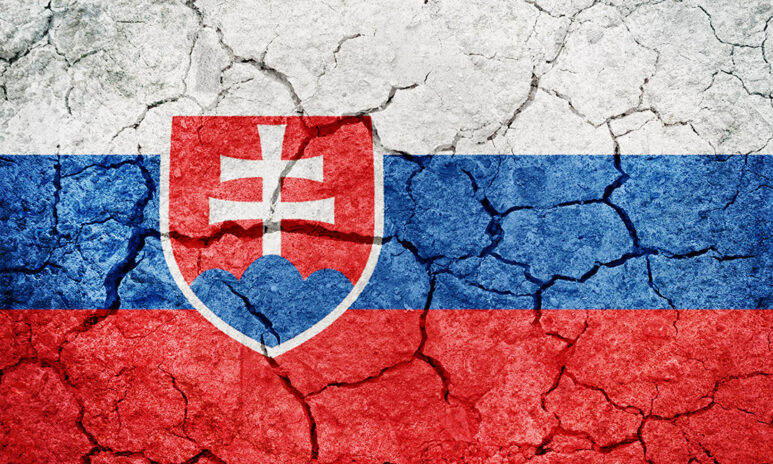By Philippe Riboton, Managing Director of HR Partners International Executive Search
In recent conversations with a dozen Slovak leaders of international companies – including some of the country’s largest investors – an alarming sentiment has emerged: some are contemplating leaving Slovakia. This idea is fueled by what they describe as a paralysis within Slovak civil society. One leader articulated this vividly: « We were the economic tiger of Central Europe; now we risk turning into a dinosaur. » This raises a crucial question: are we on the brink of a real brain drain, meaning a significant exodus of some of Slovakia’s most experienced business leaders?
The recent assassination attempt on Slovak Prime Minister Robert Fico has shocked the world, revealing the extreme division this nation is experiencing. Slovakia, often portrayed as a paradise for international investors, now faces significant turmoil. This extraordinary event represents a second major shock for Europeans following the surprise victory of Peter Pellegrini in April’s Slovak presidential election, propelled by an unabashed pro-Russian rhetoric.
This comes just a few months after the return to power of populist Robert Fico, who won the last parliamentary elections and is widely suspected of steering the country towards Hungarian-style isolationism. Notably, Fico’s parliamentary majority is elected for four years while the President is elected for a five-year term.
The conjunction of these phenomena is severely challenging Slovak business leaders – especially those heading local operations of international companies – regarding their confidence in the country’s future.
“The atmosphere in society has become unbearable”
“I don’t know what’s happening to me, » confesses the general manager of the Slovak branch of a large Swiss pharmaceutical group. « I’m almost at the peak of my career, I drive a nice car, I’ve bought a beautiful apartment in Bratislava as well as a mountain chalet… and yet I find no meaning in any of this. The atmosphere in society has become unbearable and I no longer see a future for myself in my own country. »
This sentiment is echoed by others in similar positions.
“The presidential election was the final trigger, especially for Western Slovaks with international education », the Prague-based Slovak leader of a large international outsourcing company told me. « This was the last straw after everything we’ve heard in the past months about new laws reducing penalties for corruption (which could be a blessing for open fraud in public tenders), plans to remove legislative measures protecting the environment, proposals for higher taxes on high-income earners, politicians openly criticizing public media and the LGBT community, and the growing criticism of international investors, Brussels, and NATO. My opinion is that the exodus is coming.”
The situation of polarization seems to differ significantly between Bratislava and the rest of the country. In Bratislava, attitudes tend to be more tolerant compared to other regions, where there is significantly more animosity towards any kind of difference. This situation mirrors that of Hungary, where there is a strong divide between Budapest and the rest of the nation. The HR Manager of an international pharmaceutical company in Slovakia acknowledges that some of her friends have started buying properties outside of Slovakia due to fears about the repercussions of the war in Ukraine. Although she has not seen them leave yet, she notes that if they were offered professional opportunities outside of Slovakia, they would likely take them, though they are not proactively searching for such opportunities at the moment.
But how do Slovaks currently posted abroad view the situation? A senior Slovak executive based in Paris summarizes it this way: « The situation in Slovakia is exactly like milk reaching the boiling point”, she says. “Every new public declaration is the drop that makes the milk spill over. Every day brings a new sign that the danger to democracy is real. And she concludes: “I am sure about one thing: I will not go back to Slovakia.” A Slovak marketing executive based in Prague adds: “I was considering taking my next role in Slovakia but after the results of the last presidential election I decided not to go back and chose to stay in Prague instead.”
While it’s not entirely clear if Slovak business leaders will move from contemplating leaving to actually leaving the country, one thing seems to be clear: those Slovak leaders I spoke to who are posted abroad will not come back anytime soon.
« I don’t share the fear that one should leave Slovakia »
However, not everybody I interviewed is that pessimistic about the risk of seeing some of the elites flee their own country. Igor Janok, General Manager of Up Déjeuner and former Shell Country Chair in Slovakia, is among them, saying « Fico’s anti-European rhetoric was simply a path to power ». « Now there is a kind of double-speak”, he explains. “Whether they speak in Slovakia or outside Slovakia, they say completely different things. Fico’s internal political marketing is about gaining the support of the largest group of voters. But when it comes to international affairs, I don’t think he will follow Viktor Orban’s path. I don’t share the fear that one should leave Slovakia. The Slovak economy is the most open economy in Europe. »
Miroslav Kot, the president of the French-Slovak Chamber of Commerce, shares a similar analysis: « It is true that there are many disappointed people, » he explains, « but they were also disappointed by the previous coalition in power, which had generated a lot of expectations and ultimately led to a rise in populism. However, I do not observe a significant withdrawal of senior business leaders. Many are, however, questioning the long-term vision and strategy of our country. »
The former CEO of one of the largest international investors in Slovakia I spoke to agrees: “I can not imagine a nationalistic approach by this government at the economic level”, he says. “And I can not imagine international investors changing their approach. I see Slovakia as a fertile ground for future investments.”
« The future elites do not see themselves in their own country »
Still the head of one of the largest American tech companies in Bratislava I spoke with points to another source of distrust and disillusion: « the majority of my Slovak friends have children studying abroad—in the Netherlands, Denmark, or of course the Czech Republic”, he says, “and I think they are very likely to stay there. This is a clear sign that something is not working. The future elites do not see themselves in their own country.”
This brain drain challenge has substantial economic and demographic repercussions for the country: among other things it is severely hampering the country ability to shift from a production-based economy (the automotive sector accounts for approximately 13% of the country’s GDP and provides jobs to around 275,000 people) to one driven by innovation and higher added value sectors.
According to the Organization for Economic Cooperation and Development, about 20% of Slovak students are enrolled in a university outside Slovakia, the highest rate after Luxembourg among OECD countries (where the average stands at less than 4%). About 70% of them just cross the country’s western border to study in the Czech Republic. But what happens when they return home? According to a survey conducted by the Bratislava-based Institute for Public Affairs (IVO), more than 60% of university graduates in Slovakia are considering leaving the country.
The four critical factors often highlighted by experts are socio-economic problems, dysfunctional state and public institutions, the failings of the education system, and socio-cultural backwardness (conservatism, nepotism, xenophobia).
According to Michal Vasecka, president of the Bratislava Policy Institute, recently quoted on this topic in The Guardian: “the young generation no longer believes in Slovakia. Once they leave there is nothing for them to come back to. They consider the country a backwater.” The Chief Financial Officer of a large healthcare company in Slovakia I spoke to shares his perspective: “I have four children, all of whom study or will study abroad, and I see no practical reason to encourage them to return to Slovakia. We are falling behind, especially compared to the Czech Republic. Our education system is poor, the healthcare sector is collapsing, and we are lagging in the start-up ecosystem when compared to Prague.” He points to what he calls “systemic reasons” that require systemic changes, but yet he says he will not leave the country.
Miroslav Kot shares the same observation: « The attractiveness of the Czech Republic, and Prague in particular, is growing. The Czech Republic is the first choice for Slovak students. There is a real international competition for talent, and we need concrete measures to be more attractive and welcoming. But this first requires a general consensus on the values shared within our country. » He continues: « Young people are fleeing Slovakia because they seek a modern, tolerant, and broad-minded environment. The return of traditionalism and the questioning of liberal democratic values don’t fit their expectations. »
Brain gain vs brain drain
Adrian Vycital is also more concerned about the brain drain of young Slovaks than the potential exodus of current elites. « The exodus of top executives is the just the tip of the iceberg”, he says. Adrian is the founder of the Global Slovak Network, an NGO that aims to connect the Slovak diaspora internationally and promote know-how transfers in sectors such as education or health for example. The general consensus is that between 300,000 and 350,000 Slovak citizens currently live abroad – about half of them in Austria, Germany and the UK.
Adrian calls for a « brain gain, » meaning a public policy aimed at encouraging Slovaks around the world to return to their homeland and participate in giving it a new impetus: tax breaks for new businesses, low-interest mortgages for first-time homebuyers and income-tax exemptions for families with multiple children for example. From his point of view, the elites have not yet decided to leave, but he acknowledges « that they feel paralyzed in their expression in civil society and that they worry about their children. » The paralysis is all the more striking as the Slovak capital now offers the image of a city where the quality of life is very comfortable. Adrian Vycital humorously summarizes it: « You can live very well in Bratislava today if you stay in your bubble and don’t read the newspapers ».
« Countering the narrative by showcasing positive examples »
Empowering the Slovak diaspora is the mission of Zuzana Palovic, a migration scholar, the founder of the NGO Global Slovakia and author of several books including “The Great Return”. In my recent conversation with her she acknowledged the country’s deep divisions, likening the situation to a progressive versus traditional standoff on which direction the country should follow. However she also highlighted another critical issue: « systematic bias in Slovak media coverage of the current government – which often portrays the situation very negatively », according to her. « This skewed perspective can lead people to believe that emigration is their only option, or make Slovakia appear unattractive to return to », she said. Zuzana Palovic emphasized the importance of countering this narrative by showcasing positive examples of Slovaks who have returned and are happy at ‘home’, despite or maybe in spite of their international experience. « International Slovaks can compare; they know what is good outside, but they also know what is really good about life in Slovakia », she said. « Like the high quality of life, low crime rate and relative peace in the society (despite ideological differences). Connecting the diaspora with their Slovak heritage is crucial in encouraging them to come back and contribute to the country’s future.”
Still the risk of a brain drain of Slovak business leaders out of Slovakia is not a science fiction scenario: the convergence of testimonies I’ve gathered from top Slovak executives of leading international companies indicate a clear concern. Some are considering leaving, though they have not yet taken action and seem to be in a wait-and-see attitude.
The fact that most of those I spoke to agreed to testify essentially « off the record » signals the climate prevailing in the country. According to confidential sources, some international companies are already preparing for this anticipated brain drain and have communicated clear messages to their global headquarters about the necessity to consider sending new expatriates to Slovakia.



